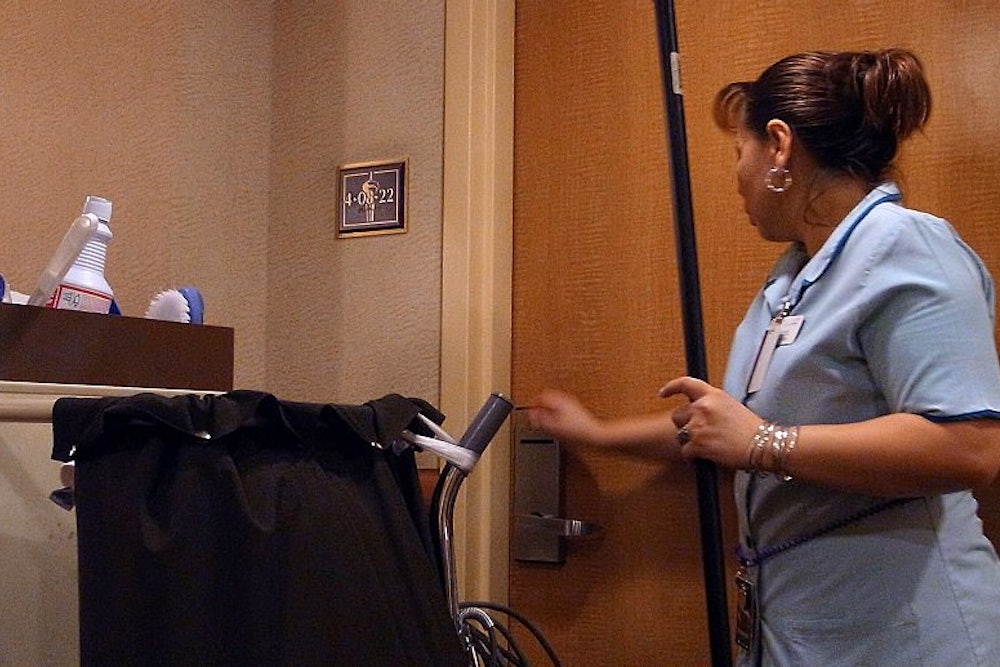On February 17, Washington Post reporter Chico Harlan published an article on what happens to communities after a small minimum wage hike. Harlan focused his piece on Shanna Tippen, a 43-year-old mother of two who earned the minimum wage at a Days Inn and Suites in Pine Bluff, Arkansas. Tippen explained how difficult it is to make ends meet since her two kids, ages 24 and 21, are unemployed and her grandchild goes through more than 100 diapers a week. The 25-cent minimum wage hike would allow her to purchase higher quality diapers for the child.
At least, that was Tippen's hope. Harlan reported Monday that Tippen had been fired from her job for speaking to the Post. She’s now looking for a new job and living off a tax refund, which, Harlan reports, “won’t last past March.” If that all sounds bad, the details of Tippen’s firing are much worse—and provide an important lesson for policymakers to protect low-income workers.
It wasn’t even Tippen’s idea to speak to a reporter. Her boss, hotel manager Herry Patel, had told Harlan to interview her. “Patel introduced Tippen to me,” Harlan wrote in his follow-up piece. “During a trip to Pine Bluff, Ark., in mid-January, I went to numerous businesses across town and found Patel in the hotel lobby and introduced myself. There, I interviewed him several minutes. Patel then suggested I speak with Tippen, who was cleaning up the continental breakfast bar. I interviewed her during her work shift, during a slow afternoon as she manned the front desk.” In the interview, Tippen didn’t criticize the Days Inn or Patel’s management style. Everything she said was uncontroversial.
The same can't be said for Patel, the hotel manager. “[The referendum] was bad,” he said. “Bad for Arkansas. Everybody wants free money in Pine Bluff.” That’s not exactly a reputation-destroying comment, but Patel apparently was upset enough by its inclusion in the piece to call “the Post to express frustration that he had been quoted giving his opinion about the minimum wage hike.”
Tippen's story is sad and infuriating, like so many other minimum wage workers who have faced unfair treatment by their employers. Jimmy John’s, for instance, required their employees to sign non-compete clauses. On Monday, Amazon removed a requirement that part-time and temporary workers sign non-compete clauses.
The best way to eliminate these ridiculous clauses is to make their costs outweigh their benefits—namely, by shaming the companies—but another way is to give workers more leverage. If jobs are plentiful, workers can demand that companies drop these non-compete clauses, and threaten to quit if they don't. This also has worked to give workers more power. Multiple companies, including Wal-Mart, have raised their workers’ wages this year as the labor market has tightened up. (Different national campaigns to pressure Wal-Mart and other low-wage employers likely played a role as well.)
When companies implement oppressive policies that take advantage of low-income workers, policymakers have the ability—if they so choose—to increase worker leverage. But Tippen's story, while it raises broader issues about low-income workers, is unique because it doesn't stem from a company-wide policy. Instead, it's the result of one manager's rage—and that makes it a more difficult problem to solve. Legislators have very little ability to design policies to stop the Herry Patels of the world.
What can legislators do? For one, they can enact policies that prevent employers from firing workers for their race, ethnicity, gender, or sexuality. As of last October, workers in 29 states could be fired for being gay. Most employers may never choose to do so, but the risk remains. (Not that I support lawmakers banning employers from firing workers who talk to the press.)
More importantly, workers like Tippen who are unfairly fired without a legal recourse demonstrate the need for a strong safety net. Congress could expand the Child Tax Credit and make it fully refundable, which would allow Tippen to buy her grandchild (soon to be grandchildren) diapers. (This is also known as a child allowance.) It could expand the Earned Income Tax Credit, which provides almost no benefits to childless adults, and pass policies that promote full employment. On the latter point, the Federal Reserve should keep interest rates at zero until wages rise to ensure more jobs are available for her.
We may not be able to stop bosses from wreaking havoc on their low-income employees' lives. But we can design a social insurance system that minimizes the damage that men like Herry Patel can cause. We just haven’t done it.
